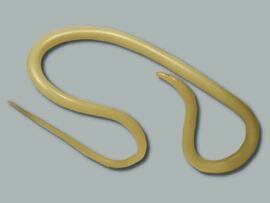Class: Nematoda
Order: Ascaroidea
Family: Acaridae
Genus: Ascaris (Linnaeus 1758)
Species: Ascaris lumbricoides
ascaris lumbricoides adult
Habitat
- Adult: in the intestine (normally in small intestine).
- The worm may migrate to ectopic site.
Geographical Distribution
- The distribution is cosmopolitan, but more frequently in the warm and moist climate.
- The mature worm is cylindrical with tapering ends.
- The male is smaller; 12 - 31 cm long and 2 - 4 mm wide and has a curved tail.
- The female 20 - 35 cm long and 3 - 6 mm wide.
- The head has 3 lips.
- The eggs when freshly passed, it is not infective and contains a single cell.
- This eggs is surrounded by irregular albumin coat.
- The eggs acquire a brownish colour from the bile pigment.
- The larva may be seen in infective lungs.

Ascaris lumbricoides adults
unfertilized and fertilized eggs
Life Cycle
- Adult worms live in the lumen of the small intestine.
- A female may produce approximately 200,000 eggs per day, which are passed with the feces.
- Unfertilized eggs may be ingested but are not infective. Fertile eggs embryonate and become infective after 18 days to several weeks, depending on the environmental conditions (optimum: moist, warm, shaded soil).
- After infective eggs are swallowed, the larvae hatch, invade the intestinal mucosa, and are carried via the portal, then systemic circulation to the lungs.
- The larvae mature further in the lungs (10 to 14 days), penetrate the alveolar walls, ascend the bronchial tree to the throat, and are swallowed.
- Upon reaching the small intestine, they develop into adult worms.
- Between 2 and 3 months are required from ingestion of the infective eggs to oviposition by the adult female.
- Adult worms can live 1 to 2 years.
Life Cycle





No comments:
Post a Comment